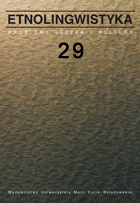Jakie dane są relewantne etnolingwistycznie?
What data are relevant to ethnolinguistic analyses?
Author(s): Stanisława Niebrzegowska-BartmińskaSubject(s): Language studies, Language and Literature Studies, Applied Linguistics, Cognitive linguistics
Published by: Wydawnictwo Naukowe Uniwersytetu Marii Curie-Sklodowskiej
Keywords: linguistic worldview; etymological ethnolinguistics; dialectological ethnolinguistics; onomastic ethnolinguistics; cognitive ethnolinguistics; systemic data; textual data; questionnaires; co-linguisti
Summary/Abstract: The article deals with the question of what data are ethnolinguistically relevant, with a view to reconstructing the linguistic worldview. Types of data are considered with regard to the names of subdisciplines (etymological ethnolinguistics, dialectological ethnolinguistics, onomastic ethnolinguistics) and the object of study (cognitive ethnolinguistics). Special attention is paid to the data used in folk or national ethnolinguistics, with a discussion of the treatment of bylica ‘sagebrush, wormwood’ in the Dictionary of Folk Stereotypes and Symbols, and of dom ‘househome’ in the Axiological Lexicon of Slavs and their Neighbours. Attention is paid to the entrenchment of features in the data from the language system, texts, and questionnaires. However, ethnolinguistically relevant data in this approach include not only those three kinds but also “co-linguistic”, “negative”, and “post-reset” data, connected with the “Polish map of non-memory” and “latent memory”.
Journal: Etnolingwistyka. Problemy Języka I Kultury
- Issue Year: 29/2017
- Issue No: 29
- Page Range: 11-29
- Page Count: 19
- Language: Polish

